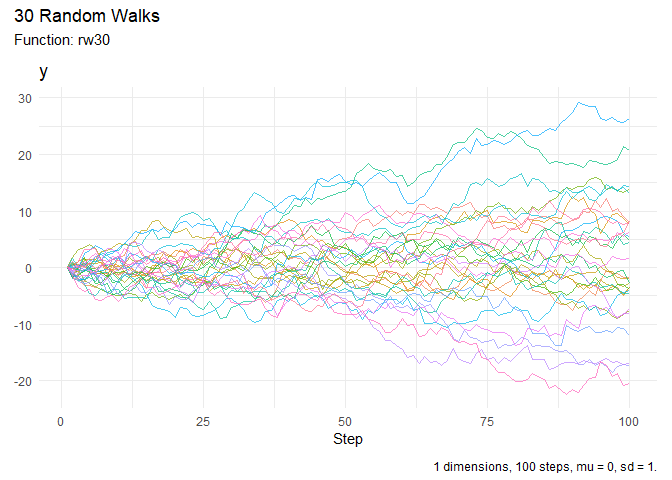
The hardware and bandwidth for this mirror is donated by METANET, the Webhosting and Full Service-Cloud Provider.
If you wish to report a bug, or if you are interested in having us mirror your free-software or open-source project, please feel free to contact us at mirror[@]metanet.ch.

The goal of RandomWalker is to allow users to easily create Random
Walks of different types that are compatible with the
tidyverse suite of packages. The package is currently in
the experimental stage of development.
You can install the released version of {TidyDensity} from CRAN with:
install.packages("RandomWalker")You can install the development version of RandomWalker from GitHub with:
# install.packages("devtools")
devtools::install_github("spsanderson/RandomWalker")This is a basic example which shows you how to solve a common problem:
library(RandomWalker)
## basic example code
rw30() |>
head(10)
#> # A tibble: 10 × 3
#> walk_number step_number y
#> <fct> <int> <dbl>
#> 1 1 1 0
#> 2 1 2 -0.341
#> 3 1 3 -0.655
#> 4 1 4 -2.98
#> 5 1 5 -3.09
#> 6 1 6 -0.585
#> 7 1 7 -1.64
#> 8 1 8 -2.69
#> 9 1 9 -1.96
#> 10 1 10 -2.55Here is a basic visualization of a Random Walk:
rw30() |>
visualize_walks()
Here is a basic summary of the random walks:
rw30() |>
summarize_walks(.value = y)
#> # A tibble: 1 × 16
#> fns fns_name dimensions mean_val median range quantile_lo quantile_hi
#> <chr> <chr> <dbl> <dbl> <dbl> <dbl> <dbl> <dbl>
#> 1 rw30 Rw30 1 0.255 0.313 44.2 -11.9 12.1
#> # ℹ 8 more variables: variance <dbl>, sd <dbl>, min_val <dbl>, max_val <dbl>,
#> # harmonic_mean <dbl>, geometric_mean <dbl>, skewness <dbl>, kurtosis <dbl>
rw30() |>
summarize_walks(.value = y, .group_var = walk_number)
#> # A tibble: 30 × 17
#> walk_number fns fns_name dimensions mean_val median range quantile_lo
#> <fct> <chr> <chr> <dbl> <dbl> <dbl> <dbl> <dbl>
#> 1 1 rw30 Rw30 1 0.177 1.41 15.1 -7.39
#> 2 2 rw30 Rw30 1 -3.40 -3.92 15.5 -8.98
#> 3 3 rw30 Rw30 1 0.427 0.259 7.61 -2.65
#> 4 4 rw30 Rw30 1 14.7 18.1 26.5 0.438
#> 5 5 rw30 Rw30 1 1.25 1.45 9.72 -2.98
#> 6 6 rw30 Rw30 1 3.08 2.43 12.6 -2.58
#> 7 7 rw30 Rw30 1 -3.69 -4.08 11.4 -8.96
#> 8 8 rw30 Rw30 1 -1.81 -1.51 7.36 -5.63
#> 9 9 rw30 Rw30 1 -5.18 -5.33 9.68 -8.86
#> 10 10 rw30 Rw30 1 3.95 4.53 14.3 -2.37
#> # ℹ 20 more rows
#> # ℹ 9 more variables: quantile_hi <dbl>, variance <dbl>, sd <dbl>,
#> # min_val <dbl>, max_val <dbl>, harmonic_mean <dbl>, geometric_mean <dbl>,
#> # skewness <dbl>, kurtosis <dbl>These binaries (installable software) and packages are in development.
They may not be fully stable and should be used with caution. We make no claims about them.